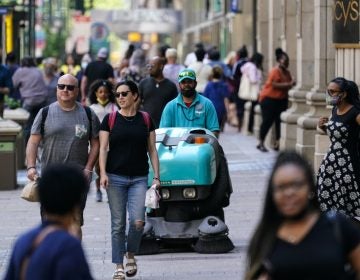W.B. Saul students head to state Envirothon competition
Last week, 54 students from six Philadelphia High Schools met at the Schuylkill Center for Environmental Education in Roxborough to take part in the county-wide “Envirothon” competition.
Each team of five students was given 25 minutes to complete each of the five environment-related tests.
Conservation Officer Jerry Czech from the Pennsylvania Game Commission was the proctor for the wildlife test, which was held in a gazebo in the forest of the Schuylkill Center.
The students put their heads together to answer a series of questions relating to deer posession policy, antler identification, bird calls and other topics.
Czech has been administering the test for all 12 years that the county competition has been held at the Schuylkill Center. A Philadelphia native himself, he said, “it’s interesting to hear some of the [student] responses.”
With bullhorn blasts signaling the end of each round, students made their way to their next outdoor testing station. At the forestry station, students had to determine how many planks of wood for construction they could get from a single tree.
The winning team, W.B. Saul High School of Agricultural Sciences, will go on to compete in the state level competition being held in Danville, Pa. From there, the students will have a shot at this year’s national championship in Canada.
The “Envirothon” began in Pennsylvania as the “Enviro-Olympics” and will return to the state next year for its 25th anniversary, to host the national competition in Selinsgrove, Pa.
Students that volunteer for the environmental club at their school prepare for the competition by attending five two-hour lectures on topics of wildlife, forestry, aquatics, soil, and one rotating category.
The fifth category is chosen by the state where the national finals are held. This year, the topic is “protecting estuaries,” which are the areas where fresh water and salt water meet.
Virginia Ranly, the Director of Education at the Schuylkill Center for Environmental Education, explains how the area, which is “the largest privately owned open space within Philly city limits” helps Philadelphia students to appreciate nature.
“We refer to it as our living classroom,” Ranly says.
Czech agrees that the Schuylkill Center provides real experiences to Philadelphia students who could not find outdoor “classrooms” anywhere else in the city.
“Instead of catching a fish in a video game, they come out here, and learn how to catch real fish,” said Czech.
As rain clouds loomed, coaches engaged in rare in-depth discussions about the weather. Not one of them consulted a weather website on their iPhone, but rather the website of the government agency, the National Oceanic and Atmospheric Administration.
Czech hopes that Philadelphia students are learning, like their coaches, how to go straight to the source when it comes to environmental education.
Maybe Philadelphians will “take out their headphones and hear actual birdsong,” he said.
WHYY is your source for fact-based, in-depth journalism and information. As a nonprofit organization, we rely on financial support from readers like you. Please give today.










